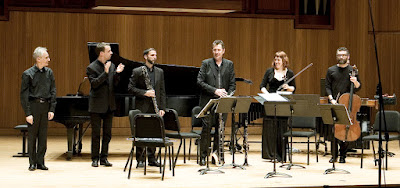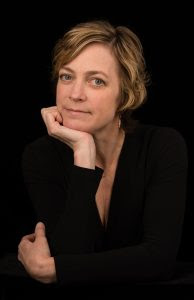The Center for 21st Century Music is excited to announce the return of Ensemble Court-circuit to the University at Buffalo on October 26th and 27th. Court-circuit joined us back in 2018 for a residency where they rehearsed and recorded UB graduate composer works and gave a concert of contemporary music, and we've been looking forward to having them back ever since.
 |
Court-circuit at the University at Buffalo in 2018
photo credit: Irene Haupt |
Some background on them from their website:
The composer Philippe Hurel and conductor Pierre-André Valade created the ensemble Court-circuit in 1991, following a meeting with the founders of Analix Gallery in Geneva. « Created by a composer for composers », Court-circuit from the outset was a place of experimentation, an art project promoting intense risk-taking in a spirit of total freedom. A strong commitment to contemporary music is the real cement of the ensemble. Court-circuit owes its nervous, rhythmic, incisive identity, as well as its banner-like name, to the musicians and their leader Jean Deroyer, who animate it with determination and virtuosity. A sought- after partner for composers, the ensemble cheerfully plays its role of agitator in the international contemporary scene.
Court-circuit was invited by highly dynamic international programming (Maerzmuzik festivals, Ultima, Printemps des Arts, Musica Electronica Nova, Traiettorie, Gaïda) and haunts the high places of French creation and dissemination: Agora festivals, Manifesto, Novelum, Aujourd’hui Musiques in Perpignan, Messiaen in the Land of Meije, the Reims Opera, the Metz Arsenal, the Caen and Besançon theaters, and the Paris Opera.
Court-circuit is also involved in interdisciplinary projects that go beyond the sphere of contemporary music. After working with the Paris Opera for choreographic creations (Preljocaj, Lagraa),the ensemble had a fruitful partnership with the Théâtre des Bouffes du Nord (Paris), where it created two chamber operas (The Second Woman – Grand Prize of Critics 2011 – and Mimi – 2014 – both composed by Frédéric Verrières and staged by Guillaume Vincent, before beginning a collaboration with the Opera Comique (Paris) where it participates in the opera La Princesse légère composed by Violeta Cruz and directed by Jos Houben (premiere in 2017).
In parallel, Court-circuit created several ciné-concerts such as Paris qui dort (a René Clair film, with music by Yan Maresz) and Les hommes le dimanche (a Robert Siodmak film, with music by Alexandros Markeas).
Court-circuit asserts its pedagogic mission by regularly working with the Paris Conservatory and the Ile- de-France conservatories. In 2012, it settled in the Hauts-de-Seine, where it conducts numerous projects with music institutions and national distribution structures.
The ensemble is regularly invited to participate in European programs, like Integra (2006-2011) dedicated to mixed music, and Re: new music project (2009-2011). Court-circuit’s discography features about twenty records that accurately reflect his extensive repertoire: Reynolds, Bertrand, Blondeau, D’Adamo, Fineberg, Grisey, Hervé, Hurel, Leroux, Matalon Monnet, Murail, Schneller, Buchala, Jodlowski…
Named several times “Favorite” by the Académie Charles Cros, these CDs were recognized by numerous awards (Le Monde de la Musique, Diapason d’Or, 10 de Répertoire).
 |
Ensemble Court-circuit
|
Throughout the day on Thursday, October 27th, they will rehearse and record works by University at Buffalo graduate composers: Francisco Courthey,
Lihuen Sirvent,
Joel Kirk, and
Thomas Little.
On Wednesday, October 26th, at 7:30 pm in Lippes Concert Hall, Court-circuit will give a concert of contemporary works, including those by UB Distinguished Professor and Birge-Cary Chair in Composition David Felder, as well as by UB Alumna Diana Soh.
The program is free and open to the public:
Sky Macklay, Fastlowhighslow for vn and pno
Anthony Cheung, Ebbing Flow for cl, vn, vc, and pno
David Felder, Rare air for cl and electronics
David Hudry, Impulses for fl, cl, vl, vc, and pno
Diana Soh, Smaller things for ensemble (version for fl)
Philippe Leroux, Postlude à l’épais for fl, cl, vl, vc, and pno
No ticket purchase at the Slee Hall box office is necessary -- just show up and looking forward to seeing you there!













